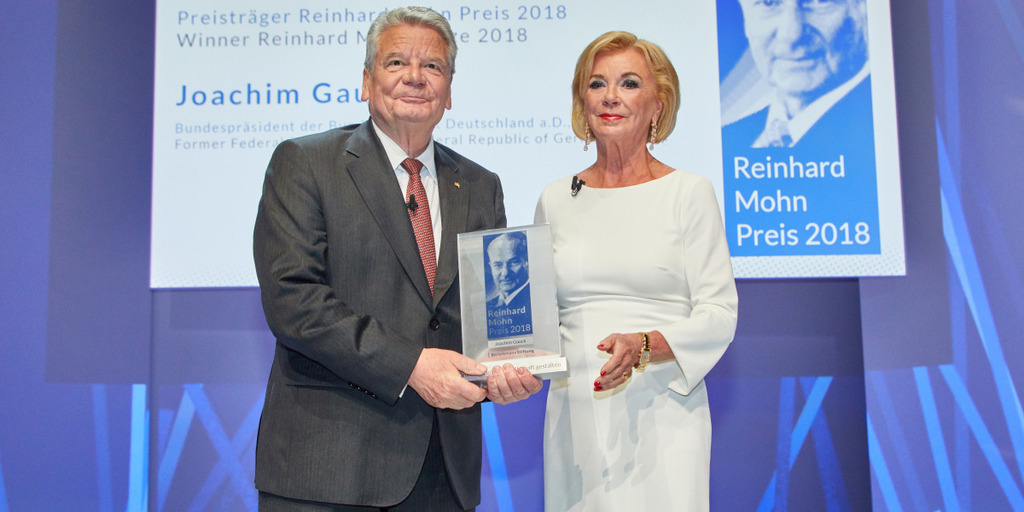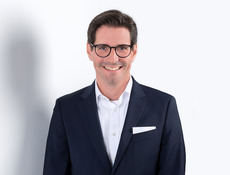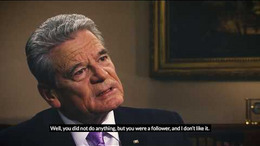The former president received our 2018 Reinhard Mohn Prize on "Living Diversity – Shaping Society" on June 7. He accepted the €200,000 prize from Liz Mohn, vice-chairwoman of our Executive Board. During his tenure as president, one of Gauck's special concerns was ensuring people of different backgrounds and religions can live together in peace. Through both his words and deeds, he was committed to creating a new sense of belonging, one that includes everyone in Germany regardless of their cultural identity. Those are the reasons for giving the award to Gauck, as cited in our explanatory statement.

Kai Uwe Oesterhelweg
2018 Reinhard Mohn Prize awarded to Joachim Gauck
On June 7 the 2018 Reinhard Mohn Prize on the topic "Living Diversity – Shaping Society" was awarded to former German President Joachim Gauck at Gütersloh Theater. In bestowing the award, we honored Gauck for his role as a bridgebuilder in a culturally diverse society.
"President Gauck never lost sight of the degree to which diversity is an enrichment for us."
Liz Mohn, vice-chairwoman of the Bertelsmann Stiftung Executive Board
"Again and again, he took a stand in favor of living together in diversity and engaging in a vigorous dialogue in a liberal and diverse country. Moreover, he always did so with courage, foresight and a fine sense of people's needs. That makes you an outstanding personality," Mohn said, addressing Gauck directly.
Gauck's tireless engagement for a free, cosmopolitan and tolerant society has left its mark on Germany. He always promoted understanding among cultures and religions and – in view of the history of two German dictatorships – defended the values of an open society. "Before many others did so, Joachim Gauck recognized that we must become familiar with disparate cultures. Only if we all know more about each other, if we are willing to engage with one another, can we coexist in peace. Only then can something new, something shared arise," Mohn emphasized in her remarks.
Learn more about the life and work of our award winner in the video
What is one's own and what is not
"In an immigration country like Germany, a sense of community cannot arise if the native and immigrant populations do not pull together to address core issues. They need essentials that are not open to debate, and they need variable rules that must be adhered to, so that this democracy, which ensures all of its citizens the same rights, is maintained and protected. In this country, the native population does not stand opposed to immigrants, in this country democratically inclined citizens stand opposed to citizens who reject plurality or who even sow hatred and are willing to become violent – be they among the native population or the immigrants," Gauck said in his acceptance speech.
As early as his inaugural speech to the German Bundestag on March 23, 2012, Gauck outlined Germany's new state of affairs: The sense of belonging in the country, he said, no longer derives only from a common history, but increasingly grows from the forward-looking "striving by a diverse society towards what is shared by all."
Gauck continues to dedicate himself to the topic of diversity
Gauck also took a clear stance in light of the increasingly heated debate about immigration and refugees. One particularly memorable moment is the 65th anniversary of Germany's Basic Law, which was commemorated on May 22, 2014. On this highly symbolic occasion, as Germany’s president he invited immigrants from 13 countries to Bellevue Palace to celebrate their becoming German citizens. In the speech he gave that day, he emphasized that "there is a new German 'we' which unifies those who are different. We do not lose ourselves when we accept diversity. We want this diverse 'we.'"
The former president is well aware of the challenges and problems stemming from living together in diversity: The risk of conflict is inherent to diversity, and concerted effort is required to maintain cohesion. Even after leaving office, Gauck has continued to address the topic of diversity. Among other activities, he is now the 2018 Heinrich Heine Guest Professor at the University of Düsseldorf, addressing the topic "Reflecting on what is one's own and what is not."
Keynote speaker praises Gauck's humility, courage and determined leadership
The presentation speech for Joachim Gauck was given by Elhadj As Sy, secretary general of the International Federation of Red Cross and Red Crescent Societies (IFRC), before an audience of some 500 guests at Gütersloh Theater. "There is only one humanity common to all of us: a diverse, a 'rainbow' humanity," he said. "People share norms and values across borders, but weaknesses and vulnerabilities also do not stop at borders. Principled, humane engagement is one way that leads us out of fear, stigmatization and exclusion to care, support and inclusion. It means supporting people in rebuilding what they consider most valuable: rebuilding their dignity. Such engagement means being part of the solution – even if it is simpler to be part of the problem. History and culture, religion and language are our compass for promoting our diverse humanity through empathy, respect and tolerance. This requires humility, courage and determined leadership – virtues to which Reinhard Mohn was committed and which are also embodied by Joachim Gauck."
Please find the impressions of the award ceremony in our gallery
Please find the record of the award ceremony and the opening movie in our YouTube-Playlist.




